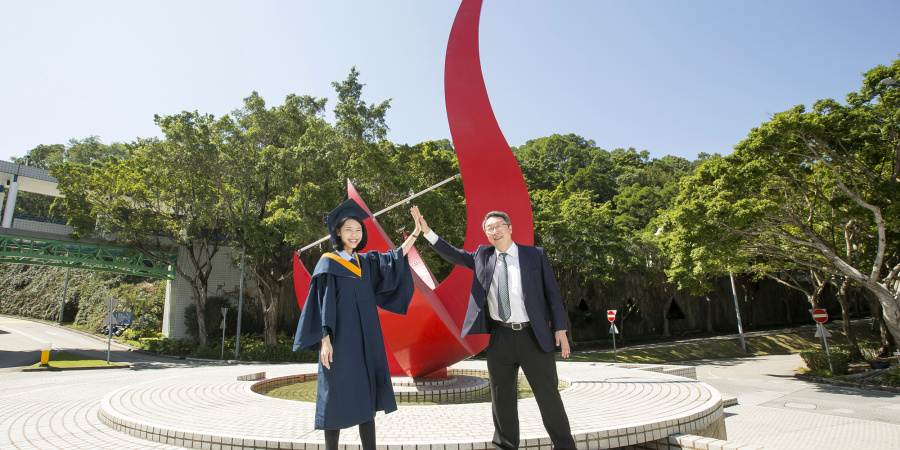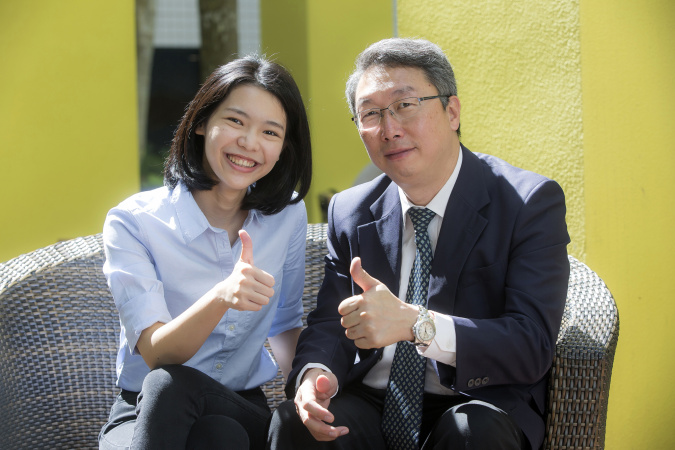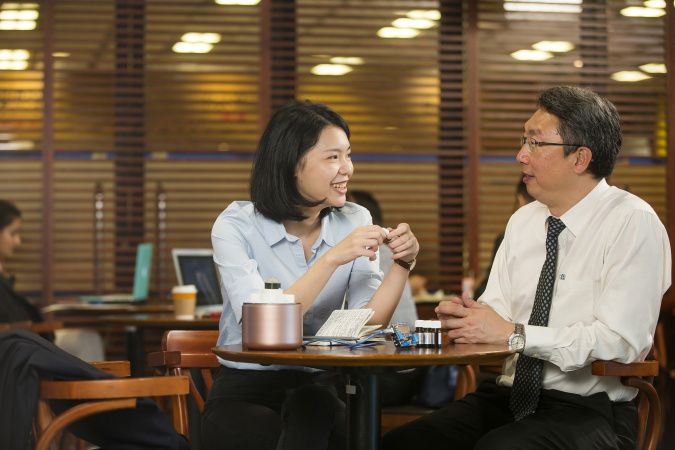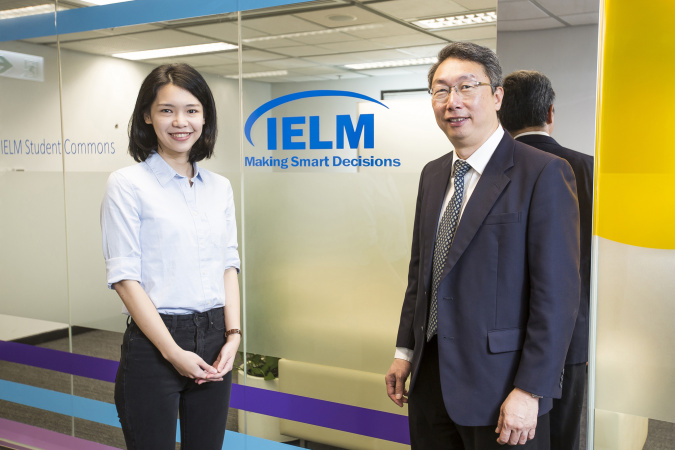SENG Alumni Stories “Passing on HKUST Engineering Spirit” – The Scent of Innovation
“Simon, I have updates!” says Michelle almost as soon as she sees Simon Law at the student commons of Department of Industrial Engineering and Logistics Management (IELM). As a Bachelor of Engineering in Logistics Management and Engineering graduate, Michelle is keen to brief Simon, also a HKUST Engineering alumnus who has been helping her with her start-up, on the latest developments in the design of her product.
Recently, Michelle’s start-up Aromeo received seed funding from technology investment fund Hong Kong X-Tech to take her aromatherapy diffuser idea to the next level. An aromatherapy enthusiast, Michelle says the idea of developing an automated diffuser struck her one evening when she found she had to put down her book to replenish the water and essential oil in her manual diffuser. With a team of fellow students from Seoul National University and Beihang University, she did market research to confirm that there was a need for the product, then refined the product design. She markets her current prototype as “nespresso for aromatherapy” – aromatherapy pods are inserted into the device which is controlled through an app so that users can schedule how long they want it to run and tinker with the oil blends.
When working on the patent application for her product, Michelle was introduced to Simon, Managing Director of Excel Technology Management Ltd., by her patent lawyer who is a HKUST alumnus too. “The lawyer mentioned that the students need some financial help,” says Simon, who has been active in mentoring young engineers at his alma mater. What impressed Simon about Aromeo’s design was that it used common components to deliver a unique service. “This is what we call mass customization, something I learnt in my master course,” he says.
In addition to making a donation to kickstart the project, Simon began to mentor the Aromeo team, sharing his wealth of experience with them. Michelle says his assistance has been invaluable – from helping them with small issues such as opening a bank account to advising them on best practices in business. “We can help them remove certain barriers or show them the different available options,” adds Simon. “For example, whether they should appoint one factory to design and manufacture their entire product or split the design and manufacturing process between factories to protect their intellectual property.” The Aromeo team is targeting hotels as the first customers for its product, but Simon has advised them not to rush into the marketing stage. “If they put it on the market too early, someone might copy it,” he says. “It’s important to find the right distribution channel to maximize profits.”
In addition to seeing potential in Michelle’s idea, Simon was immediately impressed by what he describes as her “momentum”. She had a very small but detailed notebook in which she wrote everything down,” he recalls. “My partners and I were inspired by her. She made us remember our younger days.”
Connecting theory and practice
Simon enrolled in the Master of Technology Management (MTM) programme in 2002, the first of its kind in Hong Kong, while he was managing logistics at an electronics manufacturing firm. Classes were held on weekends and students would spend a night at the university dorms. In addition to enabling them to study and complete assignments together, the arrangement fostered a tight bond between students. Simon recalls with fondness fellow students’ cooking in the dorm and dinner trips to Sai Kung. “I learnt a lot not only from the course but also from interacting with my classmates, many of whom were veterans of the supply chain and IT management field.”
His favourite spot on campus was the library because of the “extreme contrast” between the beautiful natural landscape outside and the technology such as the computers they worked on within. Simon had expected to gain theoretical knowledge from the programme, but he was also impressed by the way the professors linked theory to practice. He has found the Six Sigma method he learnt at the time extremely useful. “It’s very difficult to make a breakthrough in operational accuracy, especially when you are trying to change processes. But Six Sigma gave us the tools to eliminate almost all errors in our operations.” The Master’s programme speeded up his career development; five years after graduation Simon was the general manager (supply chain and materials) of a reputed firm.
In addition to new approaches that could be applied to his daily work, Simon gained a new network of professors and alumni. He was instrumental in setting up the alumni association for MTM graduates. “Networking is multiplier of abilities. Networking between students, alumni, schools and society can make things happen and solve old problems. It benefits all parties involved.” In addition to annual activities, the association has been particularly helpful in mentoring younger students. Simon advises young engineers to see their professors as role models. “Technology may change, but your personality will be a critical factor in your success.”
After a long and successful career in logistics management, Simon together with his fellow alumni of the MTM programme and Prof Fugee Tsung of IELM have founded Excel Technology Management Ltd. to invest in projects that employ technology developed at universities to solving daily life problems. They are currently working on a device that will reduce the cost of doing spot checks on the condition of external walls. “A few months ago, a building wall collapsed and killed a worker. Currently, the inspection process is extremely expensive. We want to create an affordable device and service,” he says.
Perseverance and paying it forward
The idea of giving back to the community also inspires Michelle, who has been struck by the “pay it forward” spirit at the university. She says that she chose to study at HKUST for its young, dynamic and entrepreneurial image, but was pleasantly surprised by the supportive culture on campus. “The night before we had to demo our product, it broke down. I put out a call for a wi-fi module at 1 am and a research student from one of the labs brought it over. It didn’t work, so at 2 am I went down to the seafront canteen and looked for an engineering student to help. The electronics engineers who happened to be there helped out,” she recalls.
Simon comments that it is this “can do” attitude that is characteristic of the engineering school. “When you encounter problems, you have to keep your momentum. We are trained to address problems, discover the constraints, and apply suitable solutions. We don’t make excuses.” It is a mindset that has kept him going throughout his career. “At our level, if the problem is not difficult, you wouldn’t be called in,” he notes, admitting that he enjoys solving tough problems. “That is every engineer’s hidden wish!” chips in Michelle with a laugh.
Having graduated from the IELM programme, Michelle is now pursuing an MPhil in Technology Leadership and Entrepreneurship. As a woman in engineering, Michelle says it’s more important to be a role model than to give advice. She also encourages young women to be confident. “I noticed that the girls in high schools are reluctant to speak up because they’re afraid of making mistakes,” she comments. “It’s something more fundamental than engineering. It’s about standing up who you are.”




